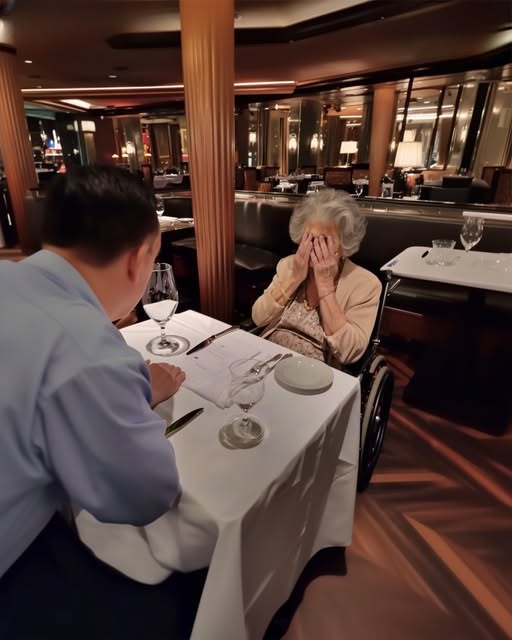I was at my small restaurant, chatting casually with my staff, when something caught my eye at a nearby table. Sitting there was a sweet older lady, likely in her mid-sixties. She wore simple clothes, but her eyes were warm and kind—they reminded me so much of my mom. She was in a wheelchair, though that didn’t take away from her quiet grace.
Beside her sat a younger man, maybe in his late twenties—most likely her son. She kept smiling at him, trying to connect, but he responded with coldness and irritation. Every word she said was met with sharp replies, like she was a burden. Then she accidentally knocked over a glass of water. It was a small accident, but the noise drew attention—and that’s when he exploded.
“FOR GOD’S SAKE! Can’t I just have one peaceful meal without you embarrassing me?! People are staring! I didn’t even want to come, but you wouldn’t stop pestering me! I CAN’T WAIT FOR THIS NIGHT TO END!”
Her expression crumbled. Tears filled her eyes, and she whispered, “Alright, let’s just go…”
I could feel my blood boiling. As both the owner of the place and a fellow human being, I couldn’t ignore it. That guy needed to be taught a lesson. I walked over calmly, but firmly, and just as he was about to speak again, I cut him off.
“Sit down. And be quiet,” I said. “You’re going to listen.”
He froze, mid-bite, eyes wide. The whole room went silent, tension hanging thick in the air.
Lowering my voice, but not my intensity, I said, “First, you owe your mother an apology. Right now. After that, you and I are going to step outside for a little conversation. Because no one speaks to their family like that—not here.”
He looked like he wanted to argue, but the room had turned against him. With reluctance, he muttered, “I’m sorry, Ma.”
It wasn’t much, but it was a start.
I asked my floor manager to help move the woman—Rosalind, I would later learn—to a quieter booth. My best server, Alma, brought her a fresh napkin and a slice of our famous lemon meringue pie—on the house. She took a bite, and I saw her shoulders drop ever so slightly, like a burden was being lifted.
Outside, under the string lights of the patio, I faced the son.
“What’s your name?” I asked.
“Dante,” he said, eyes down.
“Well, Dante, I’m Renée—the owner. And let me be straight with you. What happened in there? Not okay. Now, talk to me. What’s really going on?”
He hesitated. Then, suddenly, he broke down—not with rage this time, but exhaustion.
“I’m tired. Mom had a stroke last year. Dad died when I was a kid. I’ve been doing everything—working long hours, driving her to appointments, barely sleeping. Tonight was supposed to be a treat. I saved all week to bring her here. Then she knocked over a glass and I just… lost it.”
I nodded, leaning on the brick wall beside him.
“I’ve been there,” I told him. “My dad battled cancer. Being a caregiver can crush you. But that doesn’t give you a free pass to hurt the people who depend on you. Your mom’s not your problem—she’s your priority.”
Tears welled in his eyes. “But I can’t afford help.”
“Well,” I said, a thought forming, “I’m looking for a prep cook. Nights only, good pay. No heavy lifting. You’d learn, and you’d work with people who treat each other with respect. You want it?”
He looked stunned. “You’re offering me a job?”
“I am. But it comes with terms. You go back inside, give your mom a real apology, and start setting aside money for part-time help. One day a week, even. Deal?”
He breathed out, like he hadn’t exhaled in months. “Deal.”
Back inside, Rosalind sat quietly, her empty pie plate pushed aside. Dante approached, knelt next to her, and said, loud and clear, “Mom, I was cruel. I’m so sorry. You deserve better. I love you.”
Her hand went to his hair, smoothing it gently. “I know you’re tired, mijo. I forgive you.”
The room didn’t cheer—it wasn’t that kind of moment—but I saw people quietly wiping their eyes. The energy shifted. Peace settled back in.
And then, as if fate had a final surprise for us, a woman from the next table stood up and introduced herself.
“I’m Dr. Patel,” she said. “I run a stroke recovery center just a few blocks from here. We have a free day program with transport included. Three mornings a week. No charge.”
Rosalind gasped. Dante looked like he might cry again.
Sometimes, the world doesn’t just punish you for being cruel—it also rewards you for making it right.
